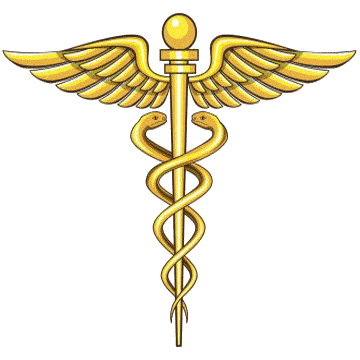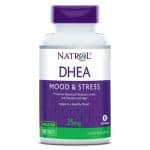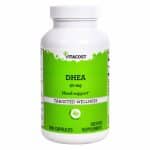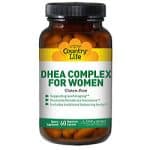Sexual function - Libido - Erection disorders
DHEA is converted into testosterone, which is known to improve libido in both men and women. This helps explain why so many people boost their sex drive when they take DHEA supplements. But the improvement in sexual desire and performance brought about by DHEA may be more than just increasing testosterone levels. Because taking DHEA increases levels of all adrenal hormones and tends to make people feel more energized and experience an overall sense of well-being. It also tends to improve overall health, and anything that improves physical health and feelings of well-being is likely to positively affect sexual health as well.
Study results vary on the use of DHEA to treat erectile dysfunction and sexual dysfunction in both men and women. However, some studies have shown that DHEA can be an effective therapy for erectile dysfunction. Although some studies are contradictory in this regard, some have shown that among men without cardiovascular disease, DHEA was able to improve the ability to have an erection.
Clinical studies
- Lahey Clinic North Shore Medical Center for Sexual Disorders in Massachusetts.
Much more information is available regarding low libido in postmenopausal women than in premenopausal women. Even less is known about androgen deficiency in young women. In one study, the level of total free testosterone was measured consecutively in 12 premenopausal women who complained of low libido. Of these, 8 had low or unmeasurable testosterone levels despite menstruating regularly. The androgen precursor hormones, DHEA-S and Androstenedione, ranged from normal/low to normal/high. Treatment with an oral DHEA supplement, 50 to 100 mg per day, restored sexual desire in 6 of these 8 women, brought partial improvement for one of them, and failed for the last. The possible significance and etiologic mechanism are under discussion. - Lahey Clinic North Shore Medical Center for Sexual Disorders in Massachusetts.
A previous study showed that pre-menopausal women could experience declining testosterone levels while continuing to have a normal menstrual cycle. Since ovarian function in these women was normal, the question of possible adrenal gland dysfunction causing the androgen deficiency has been raised. If so, the question might be whether the same defect could be seen in postmenopausal women. A study was conducted for a period of 6 months on 105 women who complained mainly of a decrease in sexual desire. The tests showed that 74 of these women (70%) had a drop in testosterone, free testosterone, and dehydroepiandrosterone sulfate (DHEA-S). 36 of them were premenopausal (aged 24 to 50), and 38 were postmenopausal (aged 47 to 78). All androgen levels for these women were lower than those found on average in women of the same age. The drop in DHEA-S levels suggests a defect in adrenal steroidogenesis, which has been observed in both premenopausal and postmenopausal women. - Department of Psychiatry and Behavioral Sciences, University of Washington, Seattle, USA.
The age-related decline of (DHEA) has promoted much research into its experimental replacement in women. Although no relationship with sexual functioning in healthy women has been observed to date, treatment with DHEA supplementation may potentially affect sexual response. To observe the effects of DHEA, 16 sexually active postmenopausal women participated in a randomized double-blind study with a placebo group, during which the oral administration of DHEA (300 mg) or a placebo was carried out 60 minutes before the presentation of an erotic video. Changes in blood DHEA sulfate (DHEAS) levels, subjective and physiological sexual response, and affective response were measured and compared against neutral video presentation. The concentration of DHEAS increased 2 to 5 times after administration of DHEA in the 16 women. The subjective response to the erotic video showed a significantly greater sexual arousal, mental (p < 0.016) and physical (p < 0.036), for the DHEA group compared to the placebo group. The affective response also increased after DHEA administration. The amplitude of the vaginal impulses and the vaginal blood volume showed a significant increase (p < 0.001) between the neutral video and the erotic video in the 2 groups (DHEA and placebo) without however being able to differentiate among those who had taken DHEA . In summary, the improvement in physical and mental arousal was significantly increased by taking an acute dose of DHEA by postmenopausal women.




